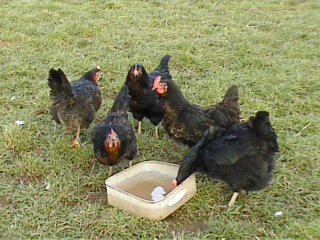Keeping Chickens at Home- What shall I keep them in?

Happy New Year everyone! Hope you've had a good one. In the picture above, my Black Rock hens have come over to the ducks feeder to see if they can get any corn that's been left or is floating on the water. I have to put the ducks corn in a container of water to stop the hens eating it first. Ducks don't mind eating their food under water, thank goodness.
Spent Xmas with my Wife's parents in Birmingham and had New Year with the family back in Plymouth. Had a great time. I'm all ready for the new year.
The dreaded spectre of Asian Bird Flu is hanging over us all and I'm going to be addressing that subject in my next post. But for today, let us look at feeding the chickens you have selected from all the different breeds we mentioned before.
During spring and summer, when the grass is growing well, chickens can get up to a quarter of their food and all their protein from it. That is assuming they are on grass in the first place. The sun will provide their vitamin D (just like us!). They'll also scratch around for extra titbits if they able.
But during Winter, when the grass has no goodness to speak off, you need to provide them with alternatives such as cabbage or any greens. My chickens also love apples and bread. Make sure these are occasional treats and only feed them such things after they have had their pellets or corn. Otherwise, they will get full up on them and egg production will suffer.
Let your chickens run around the garden by all means, but make sure they can not get into your neighbours garden as they will ruin any flowerbed. They can then lodge a complaint with the council and you are liable for putting right any damage caused. So do think carefully about going totally free range in the garden.
Keeping chickens at home is great fun, but don't let it ruin your relationship with your neighbours.
But the majority of their food will come from either Layers Pellets or Poultry Corn. Both come in either 20 or 25kg bags. If you had six chickens, this would last you about one month.
Layers Pellets are a 'complete' food. They contain all the vitamins and minerals required to keep a chicken well and laying. A word of warning here. Regular pellets contain chemical additives. I personally try to keep my chickens as close as I possibly can to the Organic standards. Organic Layers Pellets are about twice as much as regular pellets.
Be sure not to buy Breeders Pellets by mistake as these can contain antibiotics and growth hormones to fatten the birds quickly. Horrible stuff!
Poultry Corn is a mixture of maize and grain. To be honest, this is what the chickens prefer. They will always eat corn over pellets any day. However, I find the number of eggs you get reduces when more corn is consumed. I personally mix layers pellets and poultry corn 50/50.
Whatever feed you use, you will need to put it in something. A plastic 3kg Feed hopper will cost you about £7 and will be more than big enough for six hens. A Plastic 10litre drinker will cost about the same.
To have a look at all the different feeders/drinkers and othepoultryry keeping paraphernalia, go to Ascott Smallholding Supplies at http://www.ascott.biz/ They have a wide range of products available online.
Both layers pellets anpoultryry corn come in plastic bags and are an open invitation to mice and rats. They will chew through it in no time and help themselves. Buy yourself a metal dustbin and keep all your feed in that. I've yet to see them chew through steel!
Prices for pellets and corn will vary from supplier to supplier. Smaller family run outfits are normally more expensive than the larger outlets. But they can be much more convenient! At the time of writing this, my local family run agricultural merchants were selling 20kg organic layers pellets for £8.25, 25kg regular layers pellets for £4.85 and 25kgs poultry corn for £5.25.
I mix one bag of corn with one bag of pellets.
Chickens also require calcium. Egg shells don't make themselves! Leftover milk is a good source. My hens prefer a bit of brcerealst ceral left in it! The best thing to use is ground oyster shell. Your local agricultural suppliers will stock it. Just keep a small container in their run and they will help themselves when they want it.
The other thing that chickens need is some grit. Hens do not have any teeth, so they grind down their food by keeping some grit in their gizzard. The grit bashes against the grain or pellets in the gizzard breaking it down ready for digesting. If your birds have run of the garden, then they will probably find enough tiny stones to eat. Otherwispoultry 'poutry grit' from the same place you buy your feed and leave in a small container in their run like the ground oyster shell for them to help themselves.
The only other thing they need is fresh clean water. I change the water every day. Every week, I clean the feeders and drinkers, sterilising them with boiling water from the kettle.
Look for your local agricultural merchants either in the yellow pages or have a look here: http://agricultural-merchants.near2.me.uk/ Ring them up and check out feed prices in your area.
Keeping chickens at home.
